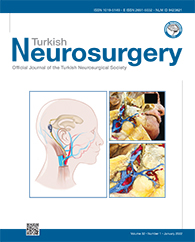2Bezmialem Vakif University, Faculty of Medicine, Department of Pediatrics, Division of Pediatric Neurology, Istanbul, Turkey
3Health Sciences University, Bakirkoy Dr. Sadi Konuk Research and Education Hospital, Department of Pediatrics, Division of Pediatric Metabolism, Istanbul, Turkey
4Health Sciences University, Van Training and Research Hospital, Departments of Radiology, Division of Pediatric Radiology, Van, Turkey
5Bezmialem Vakif University, Faculty of Medicine, Department of Pediatrics, Istanbul, Turkey
6Bezmialem Vakif University, Faculty of Medicine, Department of Neurosurgery, Istanbul, Turkey
7Baylor College of Medicine, Department of Pediatrics, Division of Pediatric Neurology and Developmental Neuroscience, Houston, USA
8Intergen Genetics Center, Division of Clinical Genetics, Ankara, Turkey
9Medipol University, Faculty of Medicine, Department of Pediatrics, Division of Pediatric Neurology, Istanbul, Turkey DOI : 10.5137/1019-5149.JTN.34196-21.4 Mitochondrial encephalomyopathy, lactic acidosis, and recurrent stroke-like episodes (MELAS) syndrome is a rare but one of the most common maternally inherited multisystem disorder. Although patients with MELAS present a variable clinical profile, strokelike lesions have been detected in 90% of cases, with stroke being the first presenting symptom in 25% of cases. However, cases of local brain edema requiring decompressive craniectomy has not been reported.
A 12-year-old male patient was admitted to our pediatric intensive care unit with altered mental status, seizures, and vision loss. The patient was stuporous and presented neck stiffness. Complete blood count, serum electrolytes, biochemistry (including lactate level), acute phase reactants, and repeated blood gas analysis were unremarkable. Brain magnetic resonance imaging (MRI) revealed an edematous stroke-like lesion in the right occipital lobe accompanied by brain swelling. Intravenous ceftriaxone, acyclovir, intravenous immunoglobulin (IVIG), and pulse steroid therapy were started for possible diagnosis of viral/bacterial/autoimmune encephalitis; levetiracetam, phenytoin, and an infusion of sodium thiopental were started for refractory status epilepticus; and a 3% NaCl infusion was started for local brain edema. The results of serum autoimmune encephalitis panel were negative. Further investigations for rheumatic, vascular, and metabolic disorders were unremarkable. Despite these supportive treatments, the patient was clinically decompensated due to brain swelling that progressed to the left midline shift, and he underwent decompressive craniectomy. Histologic examination of brain biopsy specimen revealed non-specific encephalitis findings. A pathogenic variant of the MT-TL1 gene (m.3243A>T), responsible for MELAS, was detected. The patient?s condition dramatically improved after specific treatment for MELAS.
If the diagnosis and treatment are delayed, MELAS syndrome can cause serious brain edema, which may ultimately require decompressive craniectomy.
Keywords : Child, Brain edema, Decompressive craniectomy, MELAS syndrome




